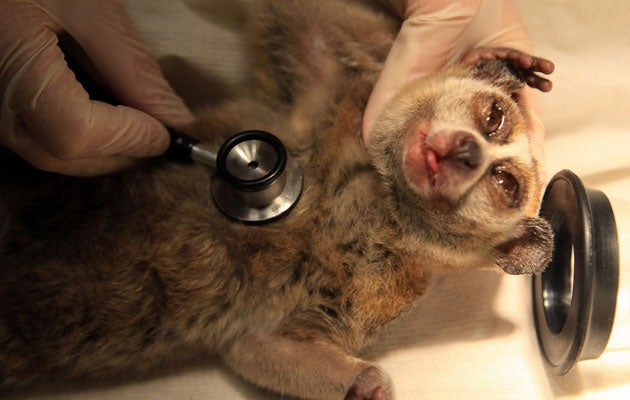
Your support helps us to tell the story
From reproductive rights to climate change to Big Tech, The Independent is on the ground when the story is developing. Whether it's investigating the financials of Elon Musk's pro-Trump PAC or producing our latest documentary, 'The A Word', which shines a light on the American women fighting for reproductive rights, we know how important it is to parse out the facts from the messaging.
At such a critical moment in US history, we need reporters on the ground. Your donation allows us to keep sending journalists to speak to both sides of the story.
The Independent is trusted by Americans across the entire political spectrum. And unlike many other quality news outlets, we choose not to lock Americans out of our reporting and analysis with paywalls. We believe quality journalism should be available to everyone, paid for by those who can afford it.
Your support makes all the difference.What courses? Veterinary medicine; animal behaviour and welfare; animal biology; animal health and welfare; bioveterinary science; equine science; equestrian sports science; veterinary biosciences; veterinary nursing science; veterinary science; zoo biology.
What do you come out with? Any one of the following: BVSc (Bachelor of Veterinary Science), BvetMed (Bachelor of Veterinary Medicine) or BVM&S (Bachelor of Veterinary Medicine and Surgery).
Why do it? "Veterinary medicine is an exciting, challenging and ever changing academic discipline with veterinarians regarded as guardians of animal health and welfare. Most applicants are attracted in the first instance by the prospect of veterinary clinical practice with its unique combination of science, art, practical skills, human-animal and interpersonal interaction. However, an increasing number follow other career paths as they become aware of the diverse opportunities provided by a veterinary degree. A veterinary degree also provides an outstanding background for those who wish to pursue a career in biomedical research, including both veterinary and human medicine." - Professor Susan M Rhind, director of veterinary teaching, University of Edinburgh
What's it about? The seven UK veterinary courses look remarkably alike because they all have to be recognised by the Royal College. They offer a strong grounding in biological sciences including anatomy, physiology and biochemistry, on which are built para-clinical disciplines such as pathology, pharmacology, parasitology and therapeutics. Students also study animal nutrition, housing and welfare. The Royal College specifies that veterinary students must undertake 38 weeks of extra-mural studies during vacations, doing placements on a range of units such as farms and stables. Expect long hours and a heavy workload, so commitment is essential. All students must graduate with the ability to treat all animals, whether domestic, farmyard or exotic according to Royal Veterinary College guidelines. Better get cracking then!
Study options: Most degrees take five years, but it's six at Cambridge. Assessment methods vary throughout the course. In the earlier years, when the focus is on theory, there will be more formal assessment by written examination. During subsequent clinical years, continuous assessment by way of coursework, practical assessments and orals is followed by end-of-degree finals. Schools offering the five-year course have the option to insert another year at the end of the second year, in which you can study specialist scientific areas to receive a BSc. Nottingham is heavily exam based but there is the opportunity to specialise a little with 12 week research projects.
What will I need to do it? A-levels in biology and chemistry are essential. At both Cambridge and RVC, you will also be expected to sit the Biomedical Admissions Test (BMAT), a supplementary science aptitude test which will examine not so much your knowledge but the way in which you approach problems and structure your thoughts. All the veterinary schools expect some pre-application work experience in a variety of fields - farms, stables, kennels or with vets. The RVC specifies that this must total at least four weeks, while Liverpool specifies a minimum of 10 weeks. In all, you'll need AAB at Liverpool and Nottingham, and AAA at Edinburgh, Glasgow and RVC. A*AA-AAA at Bristol, and A*AA at Cambridge. Some institutions require you to take the Bio-Medical Admissions Test (BMAT), and most will require at least one interview.
What are my job prospects? No need to worry. Liverpool and Glasgow have a 94 per cent graduate employment rating, while Bristol, Edinburgh and the RVC scored 91 per cent. There's an acute shortage of vets so almost all graduates find work. Most go into general veterinary practice initially. An increasing number leave after a few years for research, industry or the state veterinary service. According to The Times' Good University Guide 2012, graduates will be looking at an average starting salary of £25,807.
Where's best to do it? Glasgow was ranked top overall in the Complete University Guide 2012. Student satisfaction was highest at Cambridge however, with Nottingham’s school of veterinary medicine, which opened in 2006, achieving highest in quality of research assessment. Its location benefits from the range of agricultural and animal science facilities the university boasts. Glasgow is known for its work on parasitic diseases and on reproductive and developmental biology, while Bristol focuses on animal welfare. The Structure and Motion Laboratory is a joint venture by the RVC and UCL, and conducts research into the structure and function of the musculoskeletal system. Much of their work on horses is sponsored by organisations such as the Horserace Betting Levy Board and the Home of Rest for Horses.
Related courses: Medicine; health and social care; pharmacy and pharmacology; biological sciences; dentistry; zoology.
Join our commenting forum
Join thought-provoking conversations, follow other Independent readers and see their replies
Comments